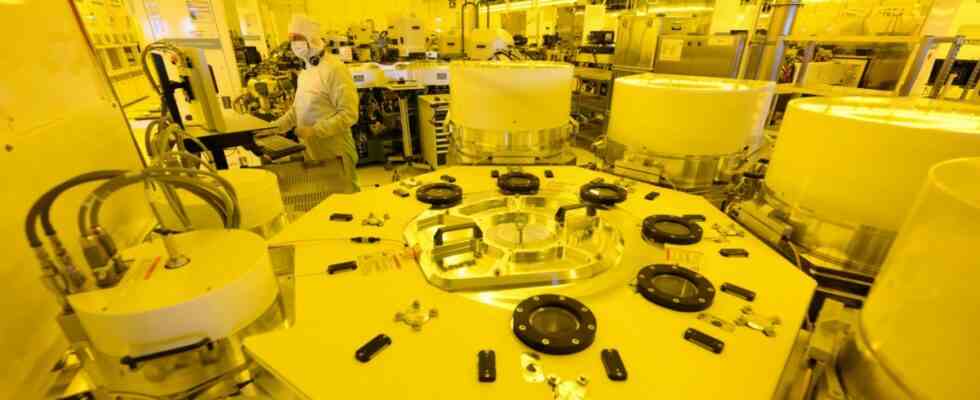It’s a big business with small parts. The Stuttgart-based supplier Bosch wants to produce even more semiconductors, i.e. small computer chips, which the automotive industry in particular is craving for at the moment. But the tiny parts are also indispensable for all other electrical devices, from cordless screwdrivers to refrigerators. Bosch is now investing three billion euros again in its semiconductor division, and the factories in Dresden and Reutlingen are being expanded.
A new development center is to be built at both locations, at a total cost of 170 million euros. The chip factory in Dresden, which was only opened last year, gets the largest investment: the clean room there is being expanded by 3,000 square meters for 250 million euros. “In the interests of our customers, we are preparing ourselves for an unabatedly growing demand for chips,” says Bosch boss Stefan Hartung.
Semiconductor plant in Dresden: Bosch wants to enlarge the clean room there for 250 million euros.
(Photo: Jens Schlueter/AFP)
Part of the investment comes from the EU and the federal government. However, Bosch did not give exact figures. This funding is mainly due to the fact that Europe wants to become more independent from Asia and the USA, where most of the semiconductors are manufactured. The goal: by 2030, twenty percent of all chips should come from Europe, so far it has been about ten percent.
The automotive industry in particular is currently suffering from the lack of chips, all manufacturers have been able to build fewer vehicles than they can deliver for months. With the switch to e-mobility, the demand for microelectronics will increase significantly, calculates Bosch boss Stefan Hartung. So far, the tiny components in a car have been worth around 200 euros, and in just a few years this amount will quadruple, Hartung predicts. That is why Bosch also puts a lot of capacity on chips for the automotive industry, but semiconductors from Dresden and Reutlingen are also found in e-bikes, cordless screwdrivers and smart glasses, for example.
A total of 700 people could work in the factory in Dresden
The factory in Dresden now employs 350 people, and by the end of the year there will be 400. Most of them are highly qualified software experts and engineers. When the factory is at full capacity, 700 people will be employed there, plus another hundred employees in the new development center, which is to be built right next to the production rooms. Stefan Hartung emphasizes that Dresden as a location has a great advantage, “the academic ecosystem”. Directly from the factory you can see a Fraunhofer Institute, for example, and many graduates come from the TU Dresden who find an attractive job at Bosch in the chip factory.
Hardly anyone believes that the demand for chips will soon drop again.
(Photo: Jens Schlueter/AFP)
But couldn’t it be that the shortage of chips will last only a few more months and in the medium term the supply will exceed the demand? The Bosch boss does not believe in that. In the automotive industry in particular, there will still be a lot of catching up to do. To this end, the focus is on certain types of chips, for example for e-cars or for smaller devices such as fitness trackers or intelligent glasses, for which the market will continue to grow significantly in the future.

